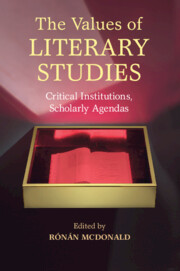Book contents
- Frontmatter
- Contents
- Notes on Contributors
- Acknowledgments
- Introduction
- 1 The Value of Criticism and the Project of Modernism
- 2 Caprice: Individual Subjectivity in Literary Criticism
- 3 The Phenomenology of Literary Valuation
- 4 Literature Is History: Aesthetic Time and the Ethics of Literary Will
- 5 Dead on Arrival: Time and the Value of Old Books
- 6 The Price of Value
- 7 To Shelter the Nothing That Happens
- 8 When Literary Criticism Mattered
- 9 Literature among the Objects of Modernist Criticism: Value, Medium, Genre
- 10 “Vale!” : Psychoanalysis, Value, and Literature
- 11 Afterlives of Comparison: Literature, Equivalence, Value
- 12 Feminism, Gender, and the Literary Commons
- 13 The Value of World Making in Global Literary Studies
- 14 Multiple Versions and Fictional Minds: Manuscript Research, Digital Editing, and Enactive Cognition in Literary Studies
- 15 After Suspicion: Surface, Method, Value
- 16 Literary Experience and the Value of Criticism
- Index
16 - Literary Experience and the Value of Criticism
Published online by Cambridge University Press: 05 November 2015
- Frontmatter
- Contents
- Notes on Contributors
- Acknowledgments
- Introduction
- 1 The Value of Criticism and the Project of Modernism
- 2 Caprice: Individual Subjectivity in Literary Criticism
- 3 The Phenomenology of Literary Valuation
- 4 Literature Is History: Aesthetic Time and the Ethics of Literary Will
- 5 Dead on Arrival: Time and the Value of Old Books
- 6 The Price of Value
- 7 To Shelter the Nothing That Happens
- 8 When Literary Criticism Mattered
- 9 Literature among the Objects of Modernist Criticism: Value, Medium, Genre
- 10 “Vale!” : Psychoanalysis, Value, and Literature
- 11 Afterlives of Comparison: Literature, Equivalence, Value
- 12 Feminism, Gender, and the Literary Commons
- 13 The Value of World Making in Global Literary Studies
- 14 Multiple Versions and Fictional Minds: Manuscript Research, Digital Editing, and Enactive Cognition in Literary Studies
- 15 After Suspicion: Surface, Method, Value
- 16 Literary Experience and the Value of Criticism
- Index
Summary
I
One of the fiercest attacks on the current state of literary studies of the past few years occurs in George Steiner's Real Presences. “At the level of critical-academic interpretation and evaluation,” he states, “the volume of secondary discourse defies inventory… The mass of books and critical essays, of scholarly articles, of acta and dissertations produced each day in Europe and the United States, has the blind weight of a tidal wave” (24). As this last (somewhat mixed) metaphor suggests, Steiner sees this proliferation as highly damaging: “A mandarin madness of secondary discourse infects thought and sensibility” (26). Nor is his rage directed only at the quantity of critical and scholarly productions: “In truth, the bulk of doctoral and post-doctoral ‘research’ into literature, and the publications which it spawns, are nothing more than a grey morass” (35).
While there is much to dislike about Steiner's tone here, I suspect that many of us who have been engaged in the study and teaching of literature over several decades feel at least a twinge of recognition at the picture he paints. To experience something like fellow-feeling in reading a book that seems so badly wrong in its basic thesis – that everything of value in art has a “religious reference or inspiration” (216) – came as something of a surprise to me, and that doubleness of response did not end there. I also found it hard to disagree with Steiner's diagnosis of the causes of what he characterises as “the dilution, the trivialization of the concept of research in the humanities”: first, the “professionalization of the academic pursuit and appropriation of the liberal arts,” and, second, “the humanistic imitation of the scientific” (35). The establishment of a career structure for huge numbers of university employees dependent upon publication of “research” in the humanities, and the modelling of that research upon the sciences, has resulted in a massive increase in the number of articles, reviews, and notes appearing annually in journals, edited collections, annotated editions, online comments, and academic talks. The introduction in certain countries of national assessments of the research produced in specific subjects, on which crucial funding decisions depend, has further increased the quantity of what we have learned to call “outputs.”
- Type
- Chapter
- Information
- The Values of Literary StudiesCritical Institutions, Scholarly Agendas, pp. 249 - 262Publisher: Cambridge University PressPrint publication year: 2015
- 12
- Cited by



